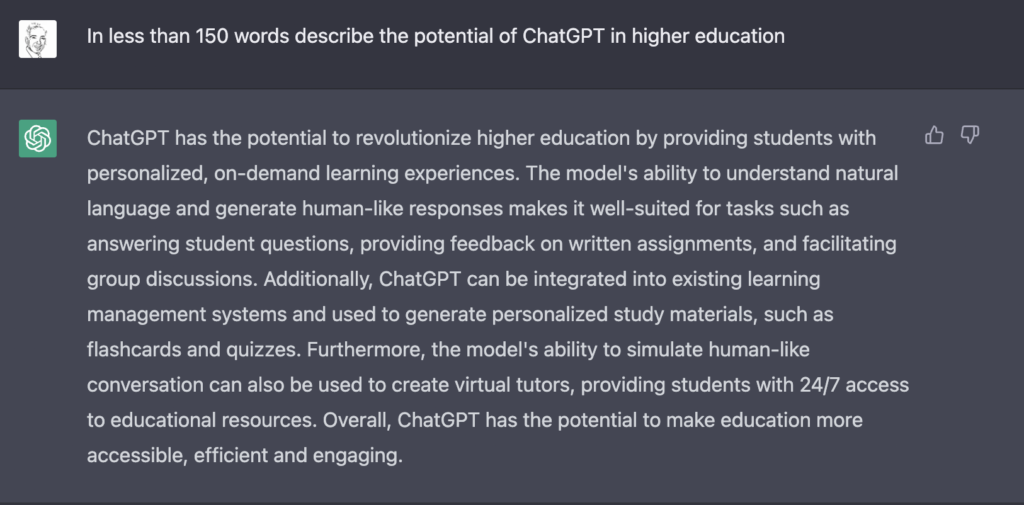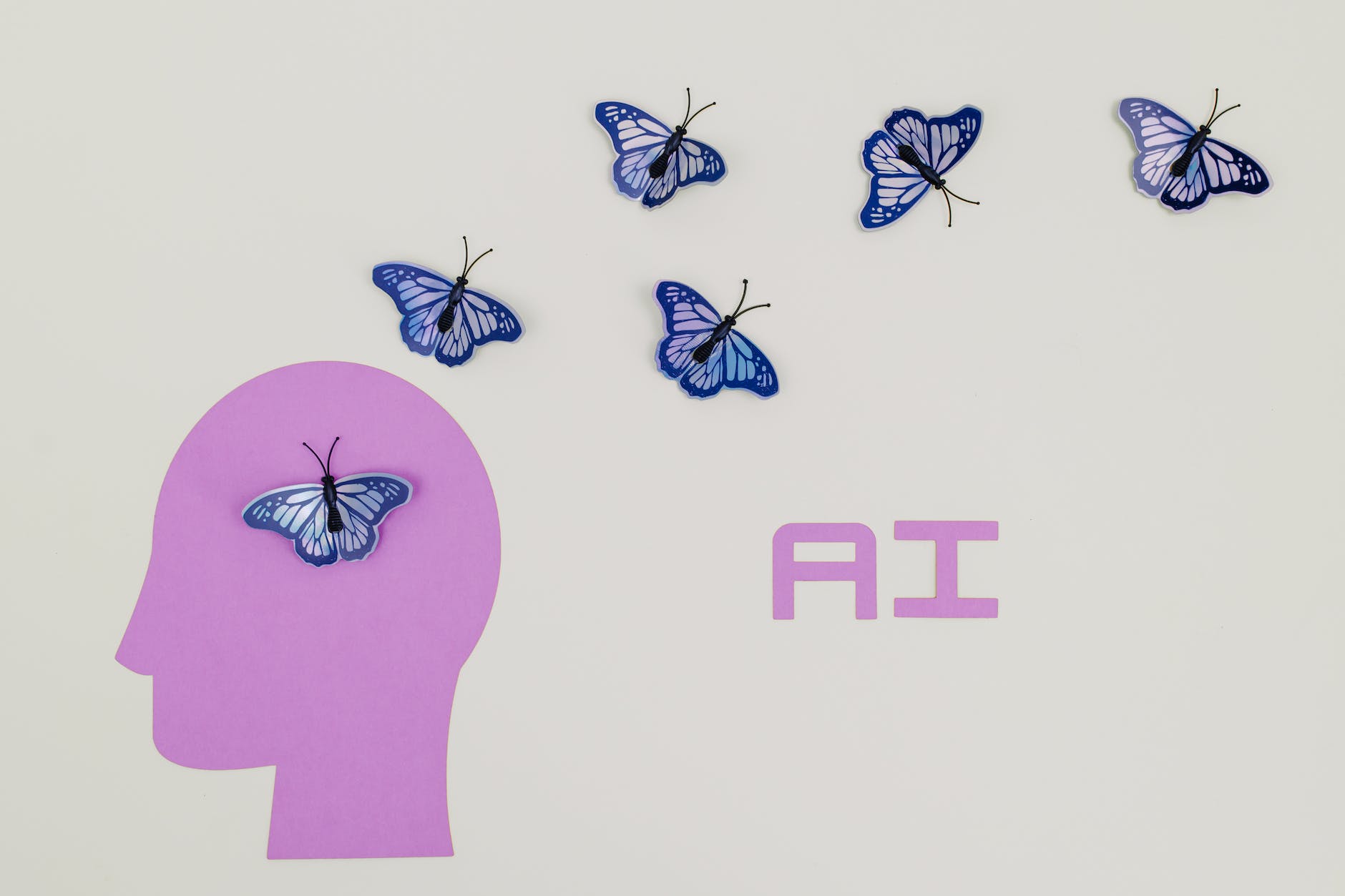Along with many other educators, over the past few months I have been experimenting with, critiquing and thinking through the implications for ChatGPT (The AI Chat facility that is ruffling some feathers in higher education). When you ask ChatGPT to identify those implications it is perhaps a very human response, in so much as when it writes about itself it is unsurprisingly positive:

What it doesn’t mention is the concern that some have about the impact of Chat GPT on written assignments and the potential use by students to use the AI systems to “cheat” their way to completing those assessments.
Now, some educators will no doubt be seeking ways in which to “catch out” those cheaters and I’ve no doubt that we will see a plethora of “edtech solutions” emerging over the coming years which say they can solve that problem (plagiarism detection and remote proctoring are two historical examples). But for me these approaches are about trying to hang on to the past, rather than considering the potential for the future.
But we’ve been here many times before and I was reminded of this via a tweet I saw as I was writing this blog post:
As this tweet alludes to, the article presents the argument that mathematicians had to deal with the issue of technology replacing the need for some human-centred effort with the invention of the electronic calculator. Initially these would carry out simple mathematical calculations, but they are now capable of carrying out increasingly complex ones. What we have realised through the invention of the calculator is that it did not diminish the need for mathematicians, but in fact served to free up mathematicians from carrying out some tasks so that they could use more human-effort to solve increasingly complex problems with the help of that (digital) technology.
It has been a fundamental principle of the evolutionary process of humankind that the value of human-effort has continued to shift since the very first humans existed, whether that be the invention of simple tools to speed up human-effort in hunting, equipment to help build better shelter, through to using complex computing or robots to complete tasks for which humans are no longer needed.
In the context of education we are often torn between maintaining an historical connection with our subject area whilst at the same time researching into the latest innovations within our disciplines. The historical connection often manifests itself as “key concepts” or “founding principles” of a subject area and sometimes these might be holding us back from making real progress. In my experience of working with mathematics educators on curriculum design activities, they have generally managed to find a good balance here between developing the fundamental principles of maths education whilst making use of technology to answer increasingly challenging and complex problems. What this means in practice is that human-effort is not wasted on tasks which can easily be completed by a computer-based system (calculator) but that the calculator (in it’s various forms of complexity) is designed into the education and learning so as to make use of it and increase the value and impact of the human-effort.
ChatGPT is perhaps the first time that we have truly realised that writing (fairly) coherent text in a range of styles at a very individual level is no longer a unique skill for humans. In fact we could argue that ChatGPT surpasses human writing in some capacity as it can formulate text based responses in a range of styles, from casual conversation to poetry through to academic essays in ways that some humans can’t (although not always perfectly but it is still learning).
So, any suggestion that we should try and block ChatGPT or minimise it’s use (particularly in education settings) is a futile attempt at maintaining a status quo that just isn’t part of the human evolutionary process. We should learn from the mathematicians and programmers who have helped shape it’s existence, embrace it’s potential and use it in ways so as to identify where we might no longer need so much human-effort and to redirect that effort to create things more efficiently than we have previously, or new things that we have not thought possible before.
Tools like ChatGPT provide us with many more opportunities than they do problems in education. We will need to change and adapt to it, and this is the most human thing we can do.




30 Responses
It’s up to all of us to make it less ‘hair shirt’ and much more ‘joy of discovery’. If students experiences are weighted more towards the former than the latter then we have failed in our role as educators. Where we can use technology to bring more joy, we should do so.
Have to be careful with joy though or we’ll end up like Lina Lamont 😉
“If we bring a little joy into your humdrum lives, it makes us feel as though our hard work ain’t been in vain for nothin’.”
Absolutely Simon! I was so glad when the switch to remote exams meant we could finally drop our calculator policy, and allow any calculator. Glad to have stayed that way for in person exams. Can’t believe that some people have reintroduced those old policies!